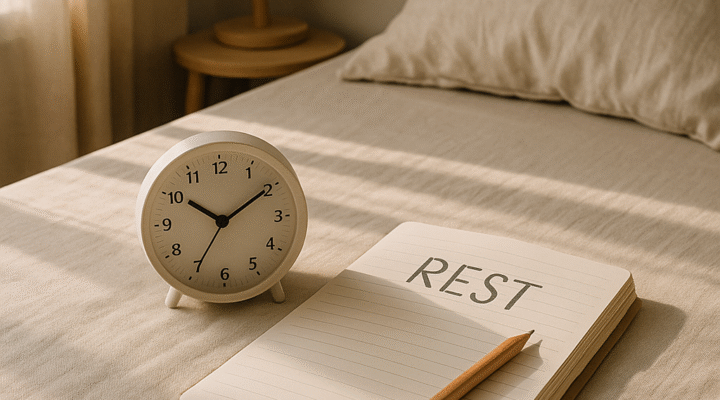
In a culture that often celebrates hustle and constant activity, rest is seen as a luxury—or worse, as laziness. But the truth is: rest is a foundational part of productivity. Without it, your focus fades, your creativity stalls, and your motivation dries up.
Rest is not the opposite of productivity. It’s what makes sustainable productivity possible. If you want to get more done with clarity and energy, it starts by honoring your need for rest.
1. Understand the Role of Rest
Rest is not just about doing “nothing.” It’s about recharging—mentally, emotionally, and physically.
- It restores your brain’s ability to focus
- It boosts memory, learning, and problem-solving
- It helps regulate emotions and stress
- It prevents burnout and supports long-term energy
Think of rest as the fuel your productivity runs on.
2. Identify the Different Types of Rest
There are several types of rest your body and mind need:
- Physical rest – Sleep, naps, or simply lying down
- Mental rest – Taking breaks from decision-making or problem-solving
- Sensory rest – Reducing screen time, noise, and bright lights
- Emotional rest – Allowing yourself to express and release emotions
- Creative rest – Stepping away to make space for inspiration
- Social rest – Time alone or with non-demanding company
Balancing these types helps keep your energy aligned.
3. Prioritize Quality Sleep
Sleep is the most essential form of rest—and often the most neglected.
- Aim for 7–9 hours of quality sleep per night
- Maintain consistent sleep and wake times
- Avoid screens and caffeine before bed
- Create a calming night routine to prepare your mind for rest
Lack of sleep impacts everything from focus to mood to immunity.
4. Take Intentional Breaks During the Day
Breaks aren’t wasted time—they’re mental resets that protect your focus.
- Follow the Pomodoro Technique: 25 minutes work, 5 minutes rest
- Take movement breaks to stretch or walk
- Pause for deep breathing or a few minutes of silence
- Don’t wait until you’re exhausted—rest before you crash
5. Listen to Your Energy Cycles
Your energy naturally fluctuates throughout the day.
- Notice when you feel most alert and focused
- Schedule high-priority tasks during peak energy times
- Use low-energy moments for rest, reflection, or lighter tasks
- Honor your body’s rhythm instead of forcing productivity
6. Schedule Rest Like You Schedule Work
If it’s not on the calendar, it often gets pushed aside.
- Add short breaks, meals, and rest periods to your planner
- Block out downtime on weekends or evenings
- Treat rest as a non-negotiable part of your routine
- You are not “wasting time” by taking care of yourself
7. Redefine What Rest Looks Like
Rest doesn’t always mean lying down or sleeping.
- It can be journaling, sipping tea, listening to music, or watching the sunset
- Anything that calms your mind and body can be restful
- The key is intentionality—not filling every free moment with stimulation
8. Notice the Signals of Burnout
Ignoring the need for rest often leads to burnout.
Watch for:
- Constant fatigue, even after sleep
- Brain fog or lack of focus
- Irritability and impatience
- Low motivation or emotional numbness
These are signs it’s time to slow down and reset.
9. Reflect on the Impact of Rest
Ask yourself regularly:
- How do I feel after resting?
- What kind of rest is missing in my routine?
- What tasks become easier after I recharge?
Rest isn’t a reward you earn—it’s a necessity you deserve.
10. Embrace Rest as Part of Your Growth
You don’t need to earn your right to rest. You need to protect it—because your mind, body, and future depend on it.
- Rest helps you return to your goals with clarity
- It allows creativity and insight to surface
- It supports emotional regulation and resilience
- Rested people make better decisions, lead better, and live better
Rest Is a Strategy, Not a Weakness
True productivity doesn’t come from pushing harder—it comes from aligning effort with recovery. Rest is what gives your work power, precision, and purpose. It allows you to show up fully, without resentment or fatigue.
So the next time you feel the pressure to “keep going,” ask yourself: Would I be more effective if I paused? Most of the time, the answer is yes.



Deixe um comentário